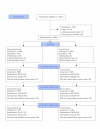Effect of tailoring in an internet-based intervention for smoking cessation: randomized controlled trial
- PMID: 22169631
- PMCID: PMC3278107
- DOI: 10.2196/jmir.1605
Effect of tailoring in an internet-based intervention for smoking cessation: randomized controlled trial
Abstract
Background: Studies suggest that tailored materials are superior to nontailored materials in supporting health behavioral change. Several trials on tailored Internet-based interventions for smoking cessation have shown good effects. There have, however, been few attempts to isolate the effect of the tailoring component of an Internet-based intervention for smoking cessation and to compare it with the effectiveness of the other components.
Objective: The study aim was to isolate the effect of tailored emails in an Internet-based intervention for smoking cessation by comparing two versions of the intervention, with and without tailored content.
Methods: We conducted a two-arm, randomized controlled trial of the open and free Norwegian 12-month follow-up, fully automated Internet-based intervention for smoking cessation, slutta.no. We collected information online on demographics, smoking, self-efficacy, use of the website, and participant evaluation at enrollment and subsequently at 1, 3, and 12 months. Altogether, 2298 self-selected participants aged 16 years or older registered at the website between August 15, 2006 and December 7, 2007 and were randomly assigned to either a multicomponent, nontailored Internet-based intervention for smoking cessation (control) or a version of the same Internet-based intervention with tailored content delivered on the website and via email.
Results: Of the randomly assigned participants, 116 (of 419, response rate = 27.7%) in the intervention group and 128 (of 428, response rate = 29.9%) in the control group had participated over the 12 months and responded at the end of follow-up. The 7-day intention-to-treat abstinence rate at 1 month was 15.2% (149/982) among those receiving the tailored intervention, compared with 9.4% (94/999) among those who received the nontailored intervention (P < .001). The corresponding figures at 3 months were 13.5% (122/902) and 9.4% (84/896, P =.006) and at 12 months were 11.2% (47/419) and 11.7% (50/428, P = .91). Likewise, the intervention group had higher self-efficacy and perceived tailoring at 1 and 3 months. Self-efficacy was found to partially mediate the effect of the intervention.
Conclusion: Tailoring an Internet-based intervention for smoking cessation seems to increase the success rates in the short term, but not in the long term.
Conflict of interest statement
The first author headed the development of the intervention tested in this paper.
References
-
- Dijkstra A. Working mechanisms of computer-tailored health education: evidence from smoking cessation. Health Educ Res. 2005 Oct;20(5):527–39. doi: 10.1093/her/cyh014. http://her.oxfordjournals.org/cgi/pmidlookup?view=long&pmid=15701665cyh014 - DOI - PubMed
Publication types
MeSH terms
LinkOut - more resources
Full Text Sources
Medical


